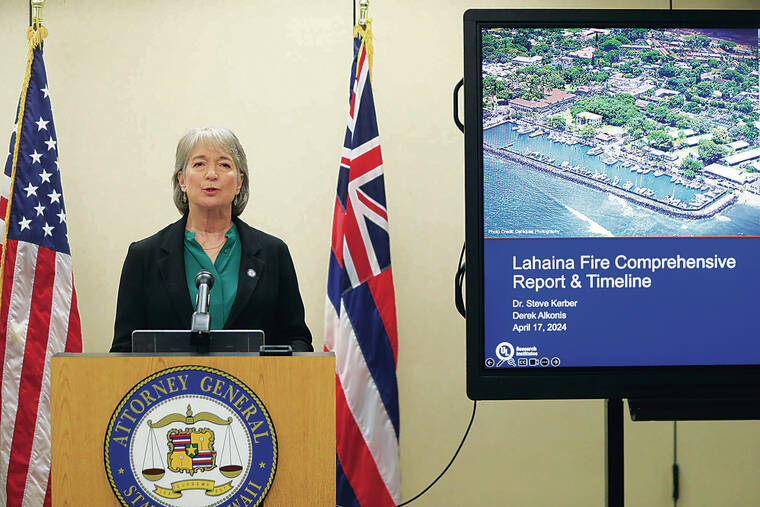State Attorney General Anne Lopez is leading a multistate legal battle to block the Trump administration in its attempt to dismantle the U.S. Department of Education, joining 20 other attorneys general in seeking a preliminary
injunction to halt widespread layoffs and service disruptions.
The legal action comes in response to a March 20 executive order directing the closure of the department, followed by a March 21 announcement from President Donald Trump mandating an immediate 50% reduction in the department’s workforce and the transfer of student loan management and special education services to outside agencies.
The coalition argues that these actions are illegal and would severely disrupt education nationwide.
In Hawaii, the impact could be devastating; the move threatens 178,000 K-12 public school students and thousands of college students who depend on federal loans and grants for postsecondary education.
“The Department of Education is essential, and it cannot be eliminated or incapacitated by the Trump administration without violating federal law,” Lopez said in a statement. “The 50% cut to the department’s workforce and transfer of department functions to other agencies causes grave harm to our state and our students. We are asking the court to step in to halt the department’s destruction.”
State Department of Education Superintendent Keith Hayashi also expressed deep concerns about the
decision, warning of disruptions to critical student services.
“The move to dismantle the U.S. Department of Education threatens critical programs that directly support our students, including those with disabilities, English learners, students experiencing unstable housing, and those in our highest-need schools,” Hayashi said. “In addition to funding, we rely on the department’s guidance to ensure compliance, plan for the school year, and sustain essential services across the state. Even with assurances that core programs will continue, a shift of this magnitude risks serious
disruptions.
The dismantling could eliminate funding for crucial programs that support students at all levels, according to U.S. Rep. Ed Case (D,
Hawaii).
One of the hardest-hit areas would be Title I schools, which serve over 104,000 low-income students in
Hawaii. The state stands to lose $72 million in funding that ensures schools have the resources they need,
potentially leading to larger class sizes, fewer teachers and cuts to vital programs.
Students with disabilities could also face severe consequences, as Hawaii risks losing $55 million in funding for specialized services like speech therapy, reading assistance and individualized education programs.
Higher education funding would also be in jeopardy.
The shutdown of the DOE could lead to the loss of
$5 billion in federal student loans, which currently assist 123,000 Hawaii residents pursuing college or vocational training. Additionally, $81 million in Pell Grants — which help more than 16,000 students afford higher education — could be eliminated, making college inaccessible for thousands of families.
University of Hawaii President Wendy Hensel expressed support for the legal challenge, stating that it would “defend the future of public education and the communities we serve.”
“Closing the U.S. Department of Education is a potentially catastrophic blow to students, especially those who rely on federal aid and support services to access higher education,” Hensel said. “At the University of Hawai‘i, this decision threatens over 100 critical programs and hundreds of jobs across our campuses.”
Hawaii’s career and technical education programs, which provide pathways to stable jobs in traditional trades and STEM fields, could also see a $13 million funding cut, jeopardizing workforce development initiatives.
Although dismantling the Department of Education requires an act of Congress, the Trump administration has already taken steps to weaken it.
Last month, it cut
$600 million in grants for teacher training programs, a critical funding source for rural school districts facing teacher shortages. Without these grants, many schools could struggle to recruit and retain qualified
educators.
The administration has also terminated nearly $900 million in contracts overseen by DOE’s Institute of Education Sciences, which conducts research on student achievement and teaching practices, threatening the availability of data used by schools, colleges and education departments to guide instruction and policymaking.
The lawsuit, led by Lopez, argues that the executive branch lacks the authority to dismantle a congressionally authorized agency without legislative approval. The coalition asserts that Trump’s move violates both the U.S. Constitution and the Administrative Procedure Act.
Hawaii’s legal team includes Solicitor General Kaliko‘onalani Fernandes, Deputy Solicitors General Ewan Rayner and Caitlyn Carpenter, and Special Assistant to the Attorney General Dave Day.
The lawsuit and motion for an injunction also are supported by the attorneys general from
Arizona, California, Colorado, Connecticut, Delaware, Illinois, Maine, Maryland, Massachusetts, Michigan, Minnesota, Nevada, New Jersey, New York, Oregon, Rhode Island, Vermont, Washington, Wisconsin and the District of Columbia.

